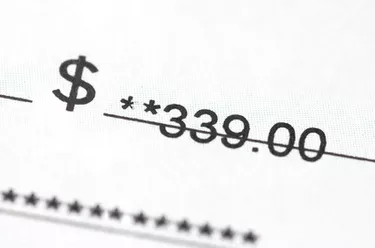
When a check does not clear, the check is normally deposited two to three times before a Non-Sufficient Funds (NSF) notification is made. There is no formal rule stating how many times a check can be deposited. The three-time check deposit rule was adopted because of a decision made by the Federal Reserve System .
Recipient's Bank
Video of the Day
The first stop for your check is your recipient's bank account. Check funds are not immediately available unless your recipient's account and the check are under the same bank. If the check and recipient's account are at the same bank, check processing is done internally. If the check is drawn under a different bank, then a request for payment of the check is sent to an intermediary bank.
Video of the Day
Intermediary Banks
Three types of intermediary banks exist. They are the Federal Reserve Bank, Correspondent Bank and Clearinghouse Corporation. The Federal Reserve Bank arranges delivery service and processing of checks for their members for a fee. There are twelve Federal Reserve branches in the United States. Correspondent banks form partnerships with other banks and process individual checks to avoid the fee charged by the Federal Reserve Bank. Clearinghouse corporations consist of groups of correspondent banks that exchange and process checks in bulk on a daily basis. Your check is sent to an intermediary bank and using the routing and account numbers from the check, a funds request is electronically submitted to the bank the check is drawn on.
Check Clearance Laws
No laws exist dictating the number of times that a check can be deposited. Section 3.1(f) of Federal Reserve Operating Circular 3 states that if a check doesn't clear its system after two deposit attempts, the check should not be presented again. All intermediary banks adopted this practice and as a result, checks are only deposited two to three times. NSF fees, averaging $32 in 2010, can be applied each time a check is refused. Collection activities can commence after the second rejection.